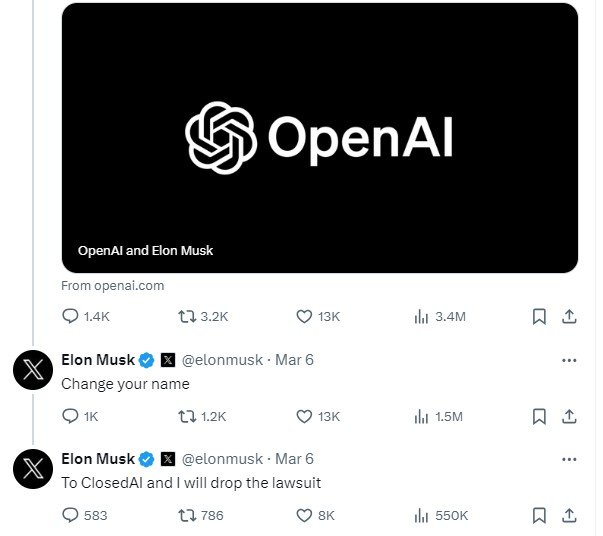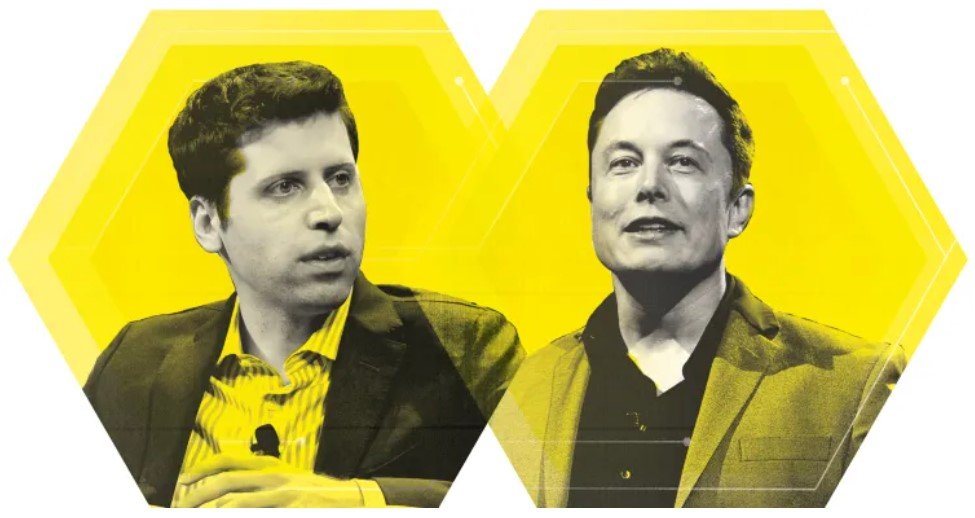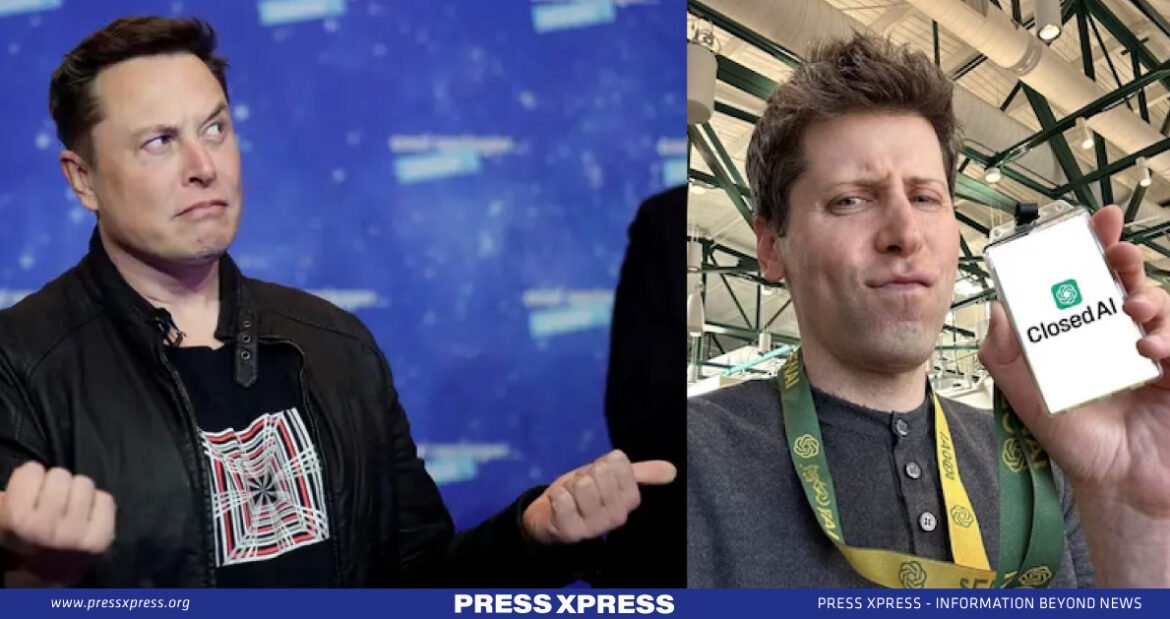Elon Musk’s OpenAI captivated the tech world’s imagination since it launched in December 2015. Co-founder Sam Altman, in dialogue with Vanity Fair, sketched a portrait of a non-profit organization dedicated to shielding humanity from the looming perils of artificial intelligence (AI). Altman’s narrative orbited around the imperative of ensuring AI’s safety while democratizing its accessibility. At the heart of this crusade stood his alliance with Tesla CEO Elon Musk, a partnership heralded by Altman for its robust synergy.
“I really trust him, which is obviously important to everyone involved,” Altman remarked.
Legal Battles and Public Feuds
Nearly a decade later, the erstwhile harmonious relationship between Musk and Altman has metamorphosed into a caustic feud. At its epicenter lies OpenAI’s transition into a for-profit entity and the emergence of a subsidiary valued at a staggering $80 billion. Alleging a breach of contract, Musk launched a lawsuit against OpenAI, indicting Altman and his cohorts for veering away from the company’s founding ethos.
” Sam Altman caused OpenAI to radically depart from its original mission,” Musk’s lawsuit asserts, igniting a tempestuous legal conundrum between two formidable figures in the AI domain.

Allegations and Counterclaims
Musk’s legal tirade paints a damning tableau of OpenAI’s evolution, accusing it of forsaking its foundational principles in pursuit of commercial gains. Central to the indictment is the assertion that OpenAI, through its dalliance with Microsoft and pursuit of profit-centric ventures, has strayed from its mandate to serve humanity. Moreover, Musk contends that OpenAI’s strides in AI, including progress towards Artificial General Intelligence, pose an existential menace to society.
“OpenAI Inc has been transformed into a closed-source, de facto subsidiary of the largest technology company in the world: Microsoft,” Musk’s suit alleges, spotlighting the gravity of the situation.
The Rebuttal: A Defense of Integrity
In retort to Musk’s legal onslaught, OpenAI unleashed a potent rebuttal, accusing Musk of duplicity and professional envy. Altman and his associates argue that Musk endorsed the transition to a for-profit entity before relinquishing his board position in 2018. Furthermore, OpenAI posits that Musk’s lawsuit constitutes a misguided attempt to impede the organization’s strides in innovation and progress.
“We’re saddened by this turn of events…someone who inspired us to aim higher, then predicted our failure, initiated a competitor, and now litigates against us as we make meaningful strides,” OpenAI lamented in a poignant blog post.

Legal Quandaries and Ethical Ambiguities
As the legal saga unfolds, pundits question the veracity of Musk’s claims and the enforceability of any founding agreements. The absence of tangible documentation delineating the terms of OpenAI’s inception casts a shadow of doubt over the lawsuit’s viability. Moreover, the nebulous terrain surrounding the development of Artificial General Intelligence injects a layer of complexity, undercutting Musk’s prognostications of impending peril.
The Origin Story: Mentorship Marred by Dissonance
Prior to the souring of their relationship, Elon Musk held a quasi-mentor role for Sam Altman. Their initial encounter transpired in the early 2010s, as Altman ascended in Silicon Valley through his involvement with the startup accelerator YCombinator, while Musk had already established himself as a titan in the tech realm. A partner at YCombinator facilitated Altman’s visit to Musk’s SpaceX rocket enterprise, an experience Altman has often recounted as profoundly inspiring.
“[Musk] elaborated on the intricacies of rocket manufacturing, yet what left a lasting impression was the unwavering certainty in his vision of sending large rockets to Mars,” Altman reflected in a 2019 blog entry. “It was a benchmark for conviction.”
Their correspondence, initiated around 2014, revolved around the perils of artificial intelligence (AI) and their conviction to guide its trajectory. Musk’s lawsuit alleges that Altman proposed the establishment of an “AI lab” in May 2015 to rival DeepMind, recently acquired by Google, acknowledging the inevitability of AI development and suggesting it should be spearheaded by entities other than Google.
With the recruitment of AI scientist Ilya Sutskever and former Stripe chief technology officer Greg Brockman as co-founders, the foundation of their company took shape. However, tensions soon emerged as Musk advocated for a more aggressive approach, proposing a staggering $1 billion funding commitment, significantly higher than Altman’s initial plan of $100 million.
The evolving dynamic between Musk and Altman within the company led to clashes over strategic direction. Musk’s impatience with the pace of progress led to proposals of integrating the company into Tesla, and he also poached talent from OpenAI for his automotive venture. Expressing skepticism about OpenAI’s relevance compared to competitors like Google, Musk ultimately departed from the company’s board in 2018 to mitigate conflicts of interest with Tesla.
In recent times, mutual admiration has given way to public criticism. Altman’s characterization of Musk as a “jerk” on journalist Kara Swisher’s tech podcast last March underscored their divergent perspectives, with Altman praising Musk’s commitment to AI while critiquing his demeanor. Conversely, Musk’s critiques of OpenAI’s ChatGPT chatbot as “woke” and his launch of a competing chatbot named “Grok” reflect his growing dissatisfaction with Altman
As the legal battle ensues, it marks a significant chapter in the tumultuous relationship between Musk and Altman, one fraught with diverging visions and aspirations for the future of artificial intelligence.


